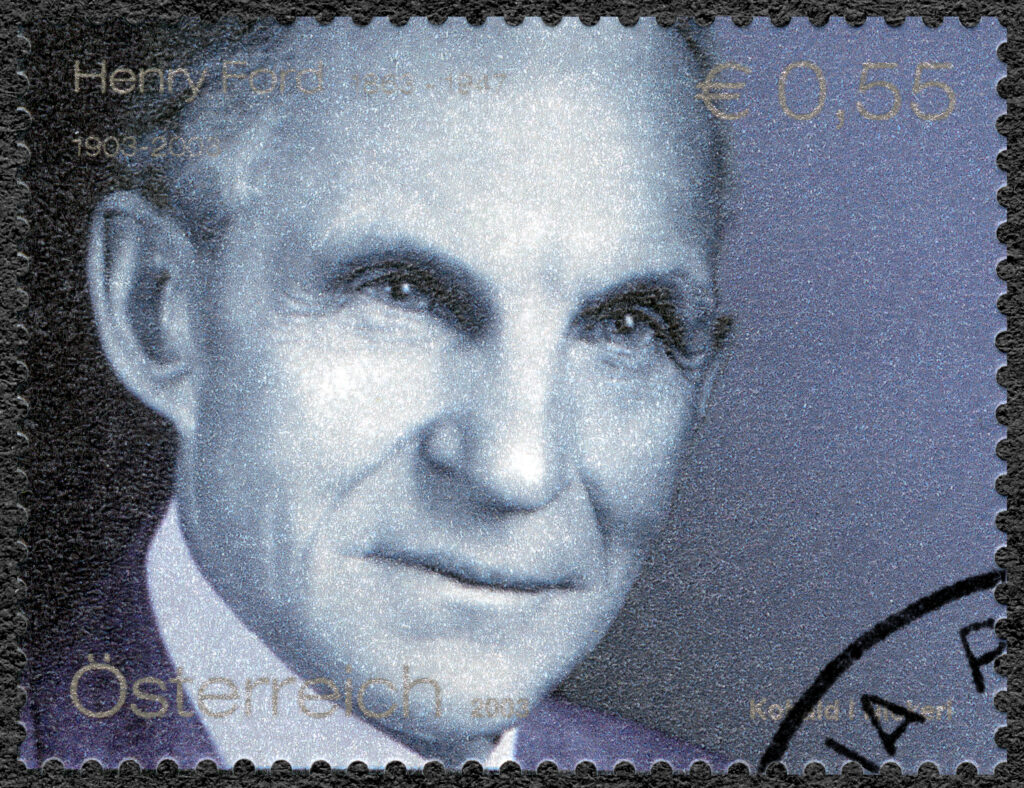Henry Ford was an immensely influential and important American industrialist and businessman who radically changed the way Americans view and purchase automobiles. His development of the assembly line helped create modern mass production.
Henry Ford’s last words are rumored to be “I’ll sleep well tonight” though that has never been confirmed. His death came on suddenly and he was surrounded by his loved ones when he passed.

Henry Ford was a complicated man with troubling views but his contribution to the automobile industry can not be overstated.
Early Life
Henry Ford was born on July 30, 1863, on a farm in Springwells Township, Michigan. His father was William Ford and his mother was Mary Ford.
Henry had four siblings: Margaret, Jane, William, and Robert.
Henry liked to create and engineer from a young age. When he was 15, his father gave him a pocket watch and he spent time dismantling and reassembling it again and again.
He was soon known as a young watch repairman to those in town.
Ford’s mother passed away when he was just 13 and the loss devastated him. Though his father wanted him to live on the farm and take over when he retired, Henry left home in 1879 to work as an apprentice machinist in Detroit.
He would soon learn how to operate and repair the Westinghouse portable steam engine and was hired by the company to service their product.
In the 1880s, Ford grew increasingly interested in engines and attempted to build a two-cylinder engine for a motor car he was building.
When the model car was completed, Henry drove it for over 1,000 miles. He then began work on his second motor vehicle.
Career
In 1891, Henry Ford was hired as an engineer for Edison Illuminating Company of Detroit. In his spare time, he would devote his energy to creating and experimenting with gasoline engines.
He crafted a self-propelled vehicle in 1896 and titled it the Ford Quadricycle.
After meeting Thomas Edison in 1896, Ford was encouraged to work even harder on building a second vehicle with his gasoline engine.
After receiving investments, Ford quit the Edison Illuminating Company of Detroit and created Detroit Automobile Company on August 5, 1899. That company was not a success and only lasted for two years.
Success
In 1903, Ford created the Ford Motor Company with the assistance of multiple investors including old partner Alexander Y. Malcomson.
Henry Ford immediately showed off Ford Motor Company’s first creation: a newly designed car that drove on frozen Lake St. Clair for a mile. The car set a land speed record of 91 miles per hour.
In 1908, Ford introduced the Model T. It had a steering wheel, an enclosed engine, and suspension tires.
The car sold for only $825 ($23,480 by today’s standards) and was easy to drive and repair.
The car was a major talking point for newspapers and Americans across the country. Sales were through the roof.
Shortly thereafter, the Ford Motor Company introduced the idea of the assembly line which made production easier and cheaper and only helped sell more Model Ts.
By 1916, Ford had sold 472,000 vehicles. It was a huge feat of engineering and business.
Two years later, half of all cars in the United States of America were Ford Model Ts.
The idea of the assembly line was quickly adapted to other companies and all car companies moving forward mimicked the technique and Ford’s price range and production ideas.
In just a few years, other car companies like Lincoln Motor Co. and General Motors would be creating hits of their own and the American automobile industry would be more successful than ever before.
In 1926, Henry Ford was convinced to create a new model and introduced Model A. It was another success and sold more than 4 million units from 1927 to 1931.
Death
Ford came into a few health problems over the following decades but continued to try and work. His mental health was also waning and he was seen as paranoid and suspicious and not sound to run a company.
In 1945, he officially retired and handed the presidency of the company to his grandson, Henry Ford II.
Henry Ford died on April 7, 1947, of a cerebral hemorrhage at his estate in Dearborn, Michigan. He was surrounded by close friends and family.
He left behind an important history with the automobile industry and also a reputation as a hard-working but deeply troubled man who held offensive views on minorities, such as Jews. That part of his legacy has become more prominent and acknowledged in the years since his death.
Despite his horrible views, Ford’s impact on the business world is undeniable and historic.